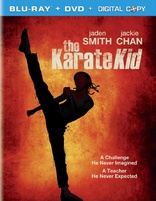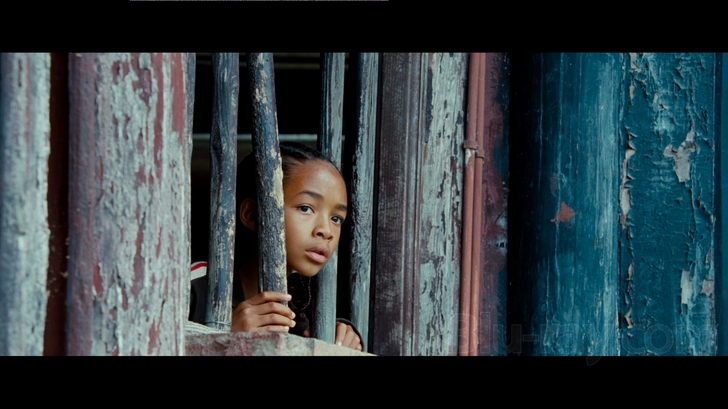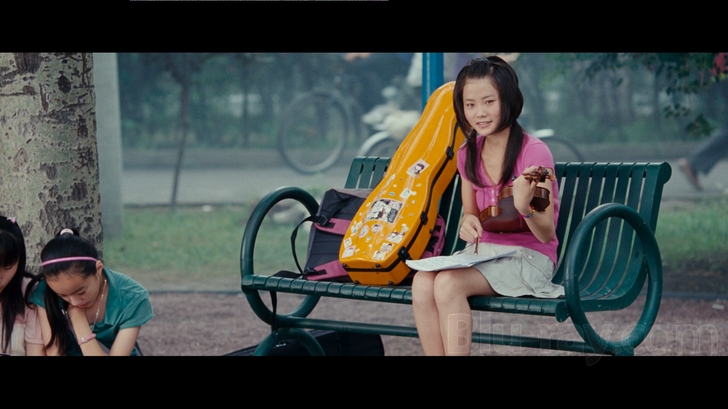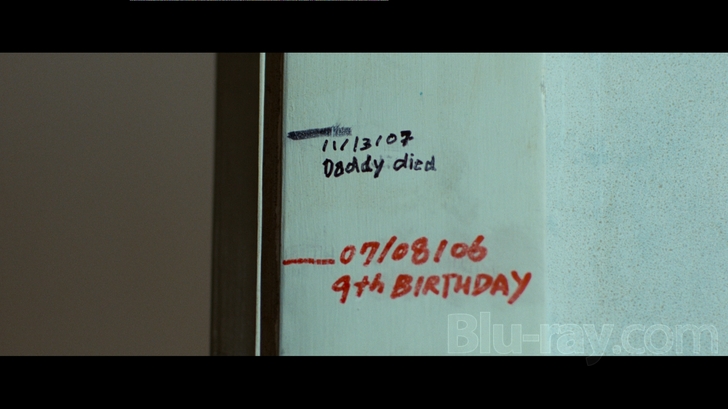The Karate Kid Blu-ray Movie
HomeThe Karate Kid Blu-ray Movie 
Blu-ray + DVD + Digital CopySony Pictures | 2010 | 140 min | Rated PG | Oct 05, 2010

Movie rating
6.4 | / 10 |
Blu-ray rating
| Users | 4.5 | |
| Reviewer | 4.5 | |
| Overall | 4.5 |
Overview
The Karate Kid (2010)
12-year-old Dre Parker could've been the most popular kid in Detroit, but his mother's latest career move has landed him in China. Dre immediately falls for his classmate Mei Ying - and the feeling is mutual - but cultural differences make such a friendship impossible. Even worse, Dre's feelings make an enemy of the class bully, Cheng. In the land of kung fu, Dre knows only a little karate, and Cheng puts "the karate kid" on the floor with ease. With no friends in a strange land, Dre has nowhere to turn but maintenance man Mr. Han, who is secretly a master of kung fu. As Han teaches Dre that kung fu is not about punches and parries, but maturity and calm, Dre realizes that facing down the bullies will be the fight of his life.
Starring: Jaden Smith, Jackie Chan, Taraji P. Henson, Wenwen Han, Rongguang YuDirector: Harald Zwart
| Action | Uncertain |
| Family | Uncertain |
| Martial arts | Uncertain |
| Sport | Uncertain |
Specifications
Video
Video codec: MPEG-4 AVC
Video resolution: 1080p
Aspect ratio: 2.40:1
Original aspect ratio: 2.39:1
Audio
English: DTS-HD Master Audio 5.1 (48kHz, 16-bit)
French: DTS-HD Master Audio 5.1 (48kHz, 24-bit)
Subtitles
English, English SDH, French
Discs
50GB Blu-ray Disc
Two-disc set (1 BD, 1 DVD)
Digital copy (on disc)
DVD copy
BD-Live
movieIQ
Packaging
Slipcover in original pressing
Playback
Region free
Review
Rating summary
| Movie | 4.5 | |
| Video | 5.0 | |
| Audio | 5.0 | |
| Extras | 3.0 | |
| Overall | 4.5 |
The Karate Kid Blu-ray Movie Review
Still the best around.
Reviewed by Martin Liebman September 21, 2010Life will knock us down, but we can choose whether or not to get back up.
A remake of The Karate Kid had to be good, had to work, had to be something
special. It's one thing to remake an obscure older title like The Stepfather and have the result be a complete dud, but it's another thing altogether when studios and
filmmakers choose to revisit sacred ground, updating a movie that didn't really need a second look to begin with. 1984's The Karate Kid is a
picture with universal appeal and strong messages on the importance of self-reliance, discipline, integrity, honor, perseverance, and the bonds of
friendship, all weaved into a wonderfully-told story and supported by some top-notch acting, including an out-of-nowhere Best Supporting Actor
Oscar nomination for the late Pat Morita. Enter 2010's remake, a picture directed by the same guy behind the abysmal The Pink Panther 2. No Pat Morita, no Daniel-san, no Cobra Kai, the
movie takes place in China instead of the United States, and Jackie Chan's take on Mr. Miyagi is Chinese rather than Okinawan. For fans
of
the original, it seemed like another eyeball-rolling lame-o attempt to cash in on an updated Hip-Hop version of a beloved classic. But wait. Though it
may have new faces in new places, 2010's The Karate Kid is still, well, The Karate Kid; it's an almost straight remake from start to
finish with, yes, some added pizzazz but also built around the same core as the original, a core that defined 1984's picture well beyond the look of
the
characters or
the backdrop against which the action played out. Director Harald Zwart's remake proves that it's a story and the essence behind it -- not just what
plays out for the camera -- that makes a movie great and why this updating of The Karate Kid is still home to one of the best stories around.

It's not quite the crane kick, but it'll do.
After the death of his father, the young street-smart Dre Parker (Jaden Smith, The Day the Earth Stood Still) and his mother Sherry (Taraji P. Henson, Hustle & Flow) pack their bags and move to China in search of a new life. Dre's not as enthused as his mother. He misses home; feels alone in a culture that's alien to him; and to make matters worse, quickly finds himself at odds with the school bullies. They're none-too-pleased that Dre's taken a liking to the young violin playing Mei Ying (Wen Wen Han), and lead bully Cheng (Zhenwei Wang) lets Dre know it by means of a severe beating. An undeterred Dre continues to form a relationship with Mei Ying, and when he gets the best of Cheng and his gang one afternoon, they track him down and beat him severely -- until a local maintenance man, Mr. Han (Jackie Chan, The Forbidden Kingdom), intervenes. Mr. Han and Dre quickly form a bond, and when Dre convinces his new friend to witness the bastardization of Kung Fu being taught by Master Li (Yu Rongguang) -- Cheng's instructor -- Han takes Dre under his wing and teaches him the finer points of martial arts so the boy may adequately defend himself, restore his honor, and get the bullies off his back by competing in a local Kung Fu tournament. Can Dre learn not only the moves he needs to beat the bully but also the life skills he needs to save, reshape, and define the entirety of his existence both now and in the years ahead?
With stories that are almost mirror images of one another and differentiated only by several obviously superficial differences that are easy to spot, about the only thing that separates the original The Karate Kid from the remake is pure nostalgia. 1984's picture has earned its place in the annals of cinema as a bona-fide classic that speaks to the very hearts of young men and women who, through the picture, learn the importance of personal honor, sacrifice, responsibility, commitment, and friendship. The remake captures those very same ideals through a story that only differs from its predecessor at the most rudimentary of levels. The fact that both pictures are nothing less than rousing successes of the triumph of the human spirit speaks volumes as to what truly makes a movie great. Strong acting, pinpoint editing, gorgeous cinematography, steady direction, and award-caliber acting are no doubt all integral elements to any quality movie, but both versions of The Karate Kid prove that it's what's below surface -- those elements that get to the very heart of a story and truly define it well beyond its basic on-screen attributes and general veneer -- that elevates a picture to heights well beyond where mere spit-and-polish can take it. That's not to dismiss the remake's exceptionally strong performances, honest direction, gorgeous visuals, and quality score, but analyzing and comparing the two pictures inevitably yields the conclusion that it is indeed the intangibles rather than the cosmetics that separate the merely good movies from the great ones, and both takes on The Karate Kid are nothing less than great.
Considering, then, that the remake does nothing new with the material, the question that begs answering is, "why bother?" The obvious -- and invariably correct -- answer is business, but there's more to love about The Karate Kid's remake that doesn't show up on Sony's year-end profit sheet. If nothing else, introducing a new generation of moviegoers to the ideals heretofore listed seems worth the picture's weight in gold. Few movies can champion honest and traditional values and inspire viewers to achieve greater heights better than 1984's The Karate Kid, and that the remake retains that same foundational core drives it to great success and alone makes the picture a worthwhile endeavor. The Karate Kid also serves as a showcase for the talents and a springboard for the career of young Jaden Smith. After impressing to no end in The Pursuit of Happyness, Smith demonstrates a level of excellence in The Karate Kid that shows him to be a highly capable actor in his own right and, here, out of his father's towering shadow. Jaden Smith shows so much personal character in the The Karate Kid -- he understands the story, the emotions behind it, and the lessons it espouses -- to a level that would put more veteran actors to shame. His ability to emote across the entire range the picture demands -- he pulls off a character that's both serious and fun, capturing all the anger; fear; sadness; and eventually, self-confidence that all define the character and make him both believable and sympathetic -- seems second-to-none for an actor of his age. If Smith's performance here and in Happyness are indications of what fans can expect of him in the future, then it's not a stretch to say he's already equalled his father in terms of raw talent.
Though its story takes center stage, The Karate Kid remake is fortunately still home to quality filmmaking. Director Harald Zwart purposefully opens the film with an emotionally-draining revelation that sets the tone for the rest of the movie and immediately informs audiences that there's more to his take on The Karate Kid than the trailers and vocally-upset fans of the original might have otherwise suggested. A makeshift growth chart penciled in on the wall reveals Dre's height at the moment he lost his first tooth, hit his first homerun, and lost his father to an untimely death. A minute into the movie and it's managed an emotional impact that puts most other pictures to shame, and that underscored suggestion that Dre's life has been shattered not only by his father's death but by the move to what seems like another world entirely only solidifies the bond he's ultimately to form with Mr. Han. From there on out The Karate Kid only plays with an honest tone that's respectful to the story and the original picture, this remake not attempting to necessarily one-up the first but instead retell its story with new people and in a new place but remaining ever-mindful of what it is that's most important to making sure it succeeds. In that way, The Karate Kid remake manages to form its own identity through both the personality of its actors and the exotic setting that serves as the backdrop for the action while still building on that deeper and far more structurally significant foundation. While longtime fans of the original will instantly recognize the paralleles shared between most any scene in the new one to some element in the old, those similarities in story, structure, and plot specifics never play as burdens but rather as reinforcements of what made the original so great and, by extension, they solidify the importance of the ideas, themes, and concepts that define both films. It's the small touches and the larger, more generalized similarities alike that only fortify the notion that the story of The Karate Kid is a timeless and necessary one and that proves that, in cinema, meaning far more often than not supersedes appearances. This update does the original's most important elements proud.
While Mr. Han's jacket routine won't ever replace "sand the floor" or "wax on, wax off," this updating nevertheless takes full advantage of the original's insistence on displaying untraditional training techniques as a means of proving that fighting isn't necessarily just about takedowns, punches, and kicks, but instead an extension of the body and mind. These techniques demonstrate both mental and physical discipline that trains the body without pounding in the notion that's it's all about violence and nothing but violence, as demonstrated by the Cobra Kai in the previous picture and Master Li's teachings in the remake. Behind the training in 2010's version is not Pat Morita's Mr. Miyagi but Jackie Chan's Mr. Han; no doubt of all the changes, Chan's portrayal of the de facto Miyagi character was the biggest question mark, and Chan pulls of the part with flying colors. He takes on a haggard and aged appearance and speaks with broken English and in a cadence that's suggestive of Miyagi, but most importantly, Chan channels Morita's performance in the way he carries the character as someone who forms a bond not just at the student-master level but also at a much deeper and far more personal one that adds the necessary weight and emotion to the coupling and reinforces the teachings that promote the martial arts as a defensive rather than offensive art and, more importantly, as a tool meant to condition not just the body but the mind, heart, and soul. Chan is nothing short of brilliant in the part, and while he probably won't find the same level of success Morita enjoyed in both the critical spotlight and in popular culture, he can proudly boast of his performance for all the right reasons.
What's more, The Karate Kid features some stunning fight choreography and action visuals that may very well better anything seen in the previous movie. There's no feeling that the actors held anything back in the brutal attacks and hard hits seen through the movie; it's all thoroughly convincing, whether playground brawls, Mr. Han's rescue of Dre in which he uses the attackers one against another, or in the tournament that's seen at film's end. The visual realism of the fights only add to the intensity and further help make Dre a necessarily sympathetic character and his attackers all the more menacing both outside the tournament and in it. With that in mind, if there's an area where the original proves vastly superior to the remake, it's in the way it makes caricatures of its bad guys and therefore allows them to stand out as larger-than-life villains with no morals, no care, and no mercy to their names or actions. The villains of 2010's The Karate Kid never quite reach the same level of scary, imposing, and creepy, but that's OK; they're but a means to an end to advance the story and form a support structure on top of which its many lessons may be built. The picture is also supported by a wonderful score courtesy of one of the true greats working today, James Horner (Glory). Horner's score combines Far East elements with a bigger, rousing feel, all the while very subtly hinting back at some of the elements heard in the original's music. It fits in terrifically with both the movie and the supporting popular music heard throughout the film. Last but not least, The Karate Kid runs well over two hours, but it never once feel it; this is a fast-paced, strongly-edited, and altogether well-made picture that manages both lightning-fast action scenes and several more dramatically emotional elements that never slow the movie down.
The Karate Kid Blu-ray Movie, Video Quality 

The Karate Kid dazzles on Blu-ray with a pristine, fresh-from-theaters 1080p transfer that's perfection in every regard. This is a colorful, clean, and highly detailed image that additionally sports nice depth and a stunning film-like texture that all make this one of the year's best transfers. Of the transfer's many positive attributes, perhaps none is more readily obvious than the handsome color reproduction on display throughout. The Karate Kid features an array of bright hues -- Mei Ying's yellow violin case, bright green foliage, Dre's light blue Detroit Lions T-shirt, and the school's orange uniform tops -- that are all faithfully and realistically reproduced, with no one color appearing over-saturated or underdeveloped. Additionally, fine details are often breathtaking; the various manmade and natural elements around China -- from the grungiest alleyways and the Great Wall itself to tree trunks and pebbly walkways in the local playground -- are impeccably realized and fit in perfectly with the transfer's limitless clarity and superb depth. The picture's varied selection of flesh tones all appear marvelously accurate, while blacks are naturally inky and never overpowering of critical details. The Karate Kid is sourced from a pristinely clear print that's free of even a hint of debris or speckling, and a fine layer of film grain coats a perfect high definition transfer. Blu-ray discs simply don't look any better than this.
The Karate Kid Blu-ray Movie, Audio Quality 

Matching The Karate Kid's stellar 1080p transfer is its crisp, accurate, and immeasurably satisfying DTS-HD MA 5.1 lossless soundtrack. Although The Karate Kid's soundtrack isn't of the powerful and mind-boggling variety, it's sure to win over audiences with the way it handles its every element to sheer sonic perfection. The track delivers everything from the high-octane popular music of Flo Rida heard during a dance video game sequence in chapter 10 to the soothing elements of James Horner's excellent score with equal precision, the picture's assortment of music playing with a spacious and smooth posture across the front and just the right level of back-channel and low-end supportive elements. Bass is wonderfully realized in both music and sound effects; there's just enough of a noticeable thud accompanying the various kicks and punches to give them a bit of additional oomph, but not to the point that they come across as cartoonish or phony. Atmospherics are superbly handled, too. Whether the falling rain that cascades around the soundstage as Dre and his mother leave Detroit or the combination of chirping birds, rustling leaves, gentle winds, and chatty children that create an entire aural world around Dre's new school in chapter three, Sony's lossless soundtrack never delivers anything but the most seamless and convincing of sonic environments. Dialogue is center-focused and never forced to compete with outside influences, and at several junctures through the film the spoken word realistically echoes throughout more cavernous locales, such as a concert hall or a spacious dojo. The Karate Kid lacks the more aggressive action elements of soundtracks that play bigger than what it has to offer, but don't let the lack of pure volume and action deter what is another pitch-perfect lossless soundtrack from Sony.
The Karate Kid Blu-ray Movie, Special Features and Extras 

The Karate Kid's Blu-ray release features a nice array of bonus material but is lacking a commentary track. First up is On Location: 'The
Karate Kid' Interactive Map of China (1080p), a piece narrated by Director Howard Zwart that shows "how the cast and filmmakers of The
Karate Kid captured China's culture and history [accompanied by] an inside look at the locations of the film." Viewers are greeted with a map that
highlights three locales: The Great Wall, Wudang Mountains, and Beijing. Selecting one brings up pictures, a fact sheet, various selectable locations for
"Beijing" and "The Great Wall," and a play button. Selecting "play" yields video behind-the-scenes footage narrated by Howard Zwart. Next is a series
of nine production diary videos presented in 1080p high definition, most of which are fairly self-explanatory as to what fans can expect to find.
Included is Training Jaden (3:12); Jaden Smith, A Day in the Life (3:50); The Forbidden City (3:59); From Jackie With
Love (3:56), a piece featuring Chan discussing what attracted him to the role and his impressions of working in China, while other cast and crew
discuss what it was like to work with a screen legend; The Great Wall (3:10); Olympic Village (3:06), a look at shooting around the
newly-built and famous location; Director Profile (2:19), a feature that showcases Director Howard Zwart's progress from pitching an idea to
filming it with Chan and Smith; Taraji P. Henson Goes to China (2:40); and Wudang Mountains (3:19).
Chinese Lessons (1080p) is an interactive feature that strives to teach users some basic Chinese words and phrases. Next up is Just for
Kicks: The Making of 'The Karate Kid' (1080p, 20:09), a quality piece that takes a glimpse into the making of the movie, beginning with the
challenge of remaking the original and moving on to look at the picture's themes, the "jacket on, jacket off" idea that was Jackie Chan's, the actors'
training for the roles, Jackie Chan's presence on the set, casting the picture, filming the kissing scene, shooting in various exotic Chinese locales, and
James Horner's score.
Also included is BD-Live functionality; MovieIQ connectivity; an alternate ending (1080p, 3:32); the music video Never Say Never by Justin
Bieber and featuring Jaden Smith (1080p, 3:49); and 1080p trailers for Grown Ups, Stomp the Yard: Homecoming, Open Season 3, Hancock, and the original The Karate Kid. Two digital copies and a DVD copy of The Karate
Kid are included. The first digital copy, made for PSP and found on the Blu-ray disc, was
unavailable for download at the time of publication. The second, housed on the DVD, was sampled on an iPhone 4. This is an excellent portable
presentation; the video transfer is colorful, sharp, and wonderfully detailed with visible but mostly unobtrusive compression artifacts. The soundtrack
is
clean and precise, with music enjoying strong clarity across the two headphone channels, supported by good atmospherics and crisp dialogue
reproduction.
The Karate Kid Blu-ray Movie, Overall Score and Recommendation 

The Karate Kid will probably prove to be a divisive picture; some will be turned off by the mere fact that it's a remake while others may be angered at the changes in setting or character alterations. Some may not like it because it's so similar to the first that the point of the remake -- beyond cashing in on the title -- might not be readily obvious. Others may love it because it's so faithful to the original. There's certainly no doubt that the movie wouldn't exist if the studio didn't feel there was money yet to be made off the franchise; the bottom line is the foundation for most any big-budget picture ever made, but with The Karate Kid the filmmakers have rekindled a classic picture that was made famous not just for its injection into popular culture but because of its timeless themes and life lessons that solidified the picture and defined its very heart and soul. Director Harald Zwart's remake of The Karate Kid proves extraordinarily faithful to the original not only through its mere copycatting of various superficial elements but by the way it respectfully recaptures the same life lessons, beats with the same heart, and stirs those same base feelings in the soul that truly makes the 2010 remake such a rousing success and an honorable companion to the original. Sony once again proves they're the best around with a Blu-ray disc that's somewhere around the pinnacle of the format in terms of its faultless audio and video presentations. Also featuring a strong assortment of bonus materials, The Karate Kid is a must-own disc and easily one of the year's best. Very highly recommended.
Other editions
The Karate Kid: Other Editions
Similar titles
Similar titles you might also like

The Karate Kid II
1986

The Karate Kid: Part III
Choice Collection
1989

The Karate Kid 4K
VHS Collectible Packaging
1984

The Next Karate Kid
Choice Collection
1994

Never Back Down
2008

Ip Man 3 4K
2015

Speed Racer
2008

Warrior
2011

Creed II
2018

Kickboxer: Vengeance
2016

Jackie Chan - Kung-Fu Master
Looking for Jackie / Xun Zhao Cheng Long
2009

Southpaw
2015

Ong Bak 3: The Final Battle
2010

The Forbidden Kingdom 4K
功夫之王
2008

Rocky Balboa
2006

Kickboxer 4K
35th Anniversary Limited Edition
1989

Bloodsport
1988

Man of Tai Chi
2013

Real Steel
2011

Ong Bak 2: The Beginning
2008


